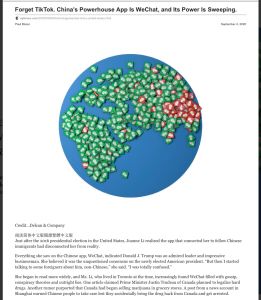
Paul Mozur
Forget TikTok. China’s Powerhouse App Is WeChat, and Its Power Is Sweeping.
A vital connection for the Chinese diaspora, the app has also become a global conduit of Chinese state propaganda, surveillance and intimidation. The United States has proposed banning it.
The New York Times, 2020
What's inside?
WeChat may bring people together, but it’s also a menacing tool for the Chinese government.
Recommendation
TikTok may be hip, but only those outside China use it. In China, people use WeChat, an all-in-one digital service for making personal connections and paying bills. For the Chinese Communist Party and its police, WeChat is a powerful tool for surveillance, manipulation and deception. Its use doesn’t stop at China’s borders. For that reason, as Paul Mozur reports in The New York Times, the United States views WeChat as a security risk. WeChat joins TikTok in the confrontation between China and America over digital technologies. Mozur illuminates the conflict Chinese people living abroad face between connecting to folks at home and being swept up in China’s surveillance state.
Take-Aways
- In China, the app WeChat serves multiple purposes; outside China, it connects Chinese expats to home.
- Founded by a game developer, WeChat earns revenues from every aspect of people’s digital lives.
- Chinese security forces use WeChat to issue threats.
Summary
In China, the app WeChat serves multiple purposes; outside China, it connects Chinese expats to home.
The WeChat app serves a wide variety of purposes for people in China. They use it to chat with friends, pay the electricity bill, share images from holidays, and much more. But for people who are part of China’s sprawling, global immigrant population, WeChat provides a platform for connecting with family, friends and life back in China.
TikTok’s creators built TikTok specifically to be enjoyed beyond China’s borders and beyond the grasp of its censorship. As TikTok fights a potential ban in the United States, China undermined its reach by officially designating its basic technology as a “national security priority.”
“Built to be everything for everyone, WeChat is indispensable.”
WeChat’s dominance and ubiquity also make it a useful tool for the Chinese Communist Party in that it has enabled the reach of Party censorship to spread worldwide. China is a powerful surveillance state, and the state uses WeChat to scrutinize and control how and with whom people interact and what information they consume. Given how the Chinese government controls WeChat at home and abroad, the United States now considers the platform a security risk. Some people in the US government have advocated banning it altogether.
Founded by a game developer, WeChat earns revenues from every aspect of people’s digital lives.
WeChat started modestly. Its umbrella company, Tencent, had developed a user base for personal computer applications. But younger users’ devotion to mobile chat apps threatened to dislodge Tencent’s dominance. For this reason, Tencent engineer Allen Zhang developed an all-in-one app that people could use for communicating, making purchases and payments, sending photos, and more.
WeChat began with Tencent’s existing users and soon its popularity pushed competing apps aside. Tencent started raking in money by developing and distributing online games, as WeChat enabled it to monetize every aspect of people’s digital lives. It can deliver ads, conduct marketing, sell a myriad of items and even organize food delivery. Tencent became a worldwide sensation, studied by experts in the Silicon Valley, but it never developed a base outside China and the worldwide Chinese immigrant community.
Chinese security forces use WeChat to issue threats.
With WeChat, the walls of China’s Great Firewall get higher and stronger. China censors the content in WeChat within the country. When someone moves and uses the app abroad, China continues to monitor and censor their usage. Algorithms control most social media, but not WeChat. Instead, the Chinese government and its censors control WeChat – so much so that undercover Chinese “military researchers” in the United States communicate with Chinese embassies using the app.
“If propaganda and censorship have found their way to WeChat users overseas, so too has China’s government.”
Chinese security forces use WeChat to threaten and manipulate people in the country’s persecuted Uighur community. While the Chinese police could use any mobile app, WeChat offers unusually broad surveillance capabilities, so it is the app of choice for various members of the state apparatus. This is problematic for someone living abroad who wants to connect with relatives back home in China, especially if they are members of oppressed groups, such as the Uighurs. While WeChat will allow you to connect with someone you thought was languishing in a reeducation camp, it also, inevitably, connects you with the Chinese government and police. Yet without WeChat, many Chinese people living in other countries would feel isolated and cut off from home.
About the Author
Two-time Pulitzer Prize finalist Paul Mozur is a technology correspondent for The New York Times focusing on the intersection of technology and geopolitics in Asia.
This document is restricted to personal use only.
My Highlights
Did you like this summary?
Read the articleThis summary has been shared with you by getAbstract.
We find, rate and summarize relevant knowledge to help people make better decisions in business and in their private lives.
Already a customer? Log in here.




















Comment on this summary